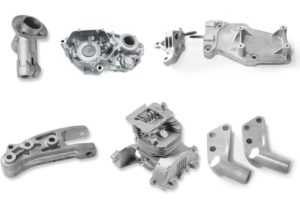The Advantages and Applications of Die Casting in the Appliance Industry

Die casting is a highly efficient manufacturing process commonly utilized in various industries, including the appliance industry. This process offers numerous advantages, such as high precision, exceptional surface finish, and quick production cycles. In this article, we will explore the benefits and applications of die casting within the appliance manufacturing sector.
1. What is Die Casting?
Die casting is a metal casting process that involves injecting molten metal into a steel mold cavity. The molten metal solidifies quickly under high pressure, resulting in a precise and detailed reproduction of the mold’s shape. This process is often used for mass production of complex parts with consistent dimensions.
2. Benefits of Die Casting in Appliance Manufacturing:
2.1 Design Flexibility:
Die casting allows appliance manufacturers to create intricate and complex shapes that are difficult to achieve through other manufacturing methods. This flexibility enables the production of aesthetically appealing and innovative designs.
2.2 High Precision and Dimensional Control:
Die casting provides excellent dimensional accuracy and repeatability, ensuring consistent quality across large production runs. This precision is crucial for components that require tight tolerances, such as electrical connectors or housing parts.
2.3 Superior Surface Finish:
Die casting produces parts with smooth surface finishes, reducing the need for additional finishing processes. This advantage is especially important for appliances that require a visually appealing appearance, enhancing their overall quality.
2.4 Cost Efficiency:
Die casting is a cost-effective production method for large quantities. The high-speed production capabilities, minimal material waste, and automated processes contribute to reduced manufacturing costs over time.
2.5 Excellent Mechanical Properties:
Die-cast components exhibit excellent strength-to-weight ratios, making them ideal for appliances that require durability and resistance to wear and tear. The inherent strength and rigidity of die-cast parts contribute to improved product performance.
3. Applications of Die Casting in Appliance Manufacturing:
3.1 Impellers and Fans:
Die casting is commonly used to manufacture impellers and fans found in appliances such as refrigerators, air conditioners, and ventilation systems. These components require intricate blade designs and precise balance for optimal performance.
3.2 Housings and Enclosures:
The appliance industry extensively employs die casting for manufacturing durable and aesthetically pleasing housings and enclosures. These include parts like refrigerator doors, oven control panels, and washing machine exteriors.
3.3 Heat Sinks:
Die casting is utilized to produce heat sinks for appliances that require efficient heat dissipation, such as TVs, computers, and audio equipment. The intricate designs of heat sinks allow for increased surface area, enhancing their cooling capabilities.
3.4 Electrical Connectors:
Die casting plays a vital role in manufacturing electrical connectors that ensure reliable connections within appliances. High precision and dimensional stability of die-cast connectors contribute to proper functionality and longevity of electrical systems.
Appliances die casting Conclusion:
Die casting offers significant advantages for the appliance industry, including design flexibility, high precision, superior surface finish, cost efficiency, and excellent mechanical properties. Its applications range from impellers and housings to heat sinks and electrical connectors. By incorporating die casting into their manufacturing processes, appliance manufacturers can achieve both functional and aesthetic excellence, ensuring the production of high-quality appliances for consumers worldwide.






